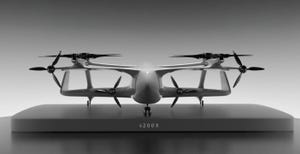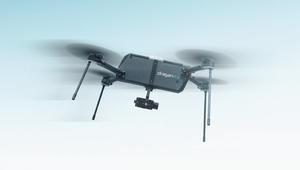FDA Clears Robotic Exoskeleton for Multiple Sclerosis PatientsFDA Clears Robotic Exoskeleton for Multiple Sclerosis Patients
Ekso Bionics’ EksoNR is the first exoskeleton device cleared for rehabilitation use for MS patients

Ekso Bionics Holdings Inc. received approval from the U.S. Food and Drug Administration to market its EksoNR robotic exoskeleton for use with multiple sclerosis patients.
The EksoNR is the first exoskeleton device to receive FDA clearance for rehabilitation use for MS patients, the company said. It was cleared for stroke and spinal-cord injury rehabilitation in 2016 and acquired brain injury (ABI) in 2020. It is also CE-marked and available in Europe.
“As a leader in early-to-market wearable robotic solutions for medical rehabilitation, we are committed to maximizing patient access to our technology,” Ekso Bionics chairman and CEO Steven Sherman said. “With the indications for use now expanded to include MS, the EksoNR has the potential to assist significantly more patients and improve patient mobility. We are excited to see the device benefit MS patients, providing critically needed rehabilitation solutions just as it has for patients suffering from stroke, spinal-cord injury and acquired brain injury.”
Unlike other exoskeletons, which are designed to be assistive devices and provide 100% of the power needed to walk, the Ekso NR is designed to be used for rehabilitation to help neurorehab patients “walk out of the device and back into their communities,” the company said.
The 60-pound suit is programmed with a suite of movements, including weight shifting, marching, stepping and tapping on a platform, split-stance and squats and provides the physical therapist visual and auditory cues to assist with care. It also has automated or therapist-programmed settings that provide varying amounts of power assistance, and all session data (walking time, distance and speed) is automatically synced to a cloud-based dashboard.
MS is a neurological autoimmune disease in which the body’s immune system attacks the central nervous system, which can disrupt communication between mind and body and lead to loss of body function and mobility. While there is no current known cure for the disease, medication management and physical therapy can help mitigate its effects.
Physical therapy can help strengthen weakened muscles, improve range of motion and slow the progression of MS, and the EksoNR helps therapists work with patients’ brain plasticity and retrain their muscles and brains to maintain or regain lost mobility, the company said.
The suit is particularly useful for MS patients with severe symptoms because it allows therapists to program the dosage of steps patients receive, thereby reducing the threat of over-exertion, which can lead to disease advancement, Ekso said.
“MS patients who use EksoNR exoskeletons are kept apprised of their progress and must actively participate in the process to succeed,” the company said. “This direct involvement and positive progress reports can have a profound psychological effect on patients, increasing their odds of improving outcomes and regaining lost strength and mobility in addition to offering them hope.”
About the Author
You May Also Like


.jpg?width=700&auto=webp&quality=80&disable=upscale)


.jpg?width=300&auto=webp&quality=80&disable=upscale)


